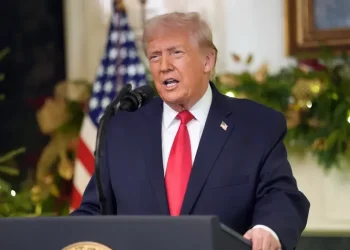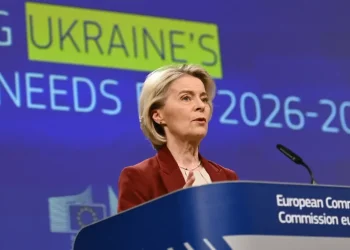Trump Jr. Visits Greenland Amid Speculation of U.S. Interest in the Arctic Territory
Greenland Receives a High-Profile Visitor
Donald Trump Jr., eldest son of President-elect Donald Trump, recently made a brief but significant visit to Greenland, sparking renewed speculation about the U.S. interest in acquiring the mineral-rich Arctic territory. The visit, accompanied by a message from his father promising, “We’re going to treat you well,” has drawn attention to Greenland’s strategic importance and its potential role in U.S. national security policy.
A Controversial Presidential Stance
President-elect Trump reiterated his administration’s interest in Greenland, emphasizing its importance for national security. At a press conference, he declared he would not rule out economic or military actions to acquire the territory. This statement aligns with his long-standing interest in Greenland, first expressed during his initial presidency.
Trump also posted a video showing a plane emblazoned with the TRUMP logo landing in Nuuk, Greenland’s capital. In his message, he stated:
“The reception has been great. This is a deal that must happen. MAKE GREENLAND GREAT AGAIN!”
Greenland’s Official Response
Despite the visit’s high-profile nature, Greenland’s government clarified that it was a private trip, and there were no official meetings scheduled. Mininguaq Kleist, Greenland’s permanent secretary of statehood and foreign affairs, confirmed that Donald Trump Jr. stayed only for a few hours to record podcast content.
While the visit did not involve direct negotiations, its political undertones were unmistakable, as the U.S. presence in the Arctic is increasingly seen as a counterbalance to the influence of China and Russia in the region.
Greenland’s Stand on Independence and Sovereignty
Greenland, an autonomous Danish territory with about 56,000 predominantly Inuit residents, has been moving toward independence. Prime Minister Múte Egede has called for breaking free from Denmark’s colonial legacy but firmly opposes any notion of U.S. ownership.
“Greenland is not for sale,” Egede stated unequivocally, aligning with sentiments expressed by Greenlandic leaders and citizens alike.
Aaja Chemnitz, a Greenlandic representative in the Danish parliament, echoed these views, emphasizing:
“Most people don’t want it. It feels disrespectful to even suggest that you can buy another country.”
Denmark’s Perspective on Greenland
Danish Prime Minister Mette Frederiksen has reaffirmed Greenland’s autonomy while maintaining that its future will be decided by its residents. Denmark remains a key ally of the United States, but Frederiksen has called for calm amid Trump’s remarks.
Denmark’s monarchy has also symbolically asserted Greenland’s significance, incorporating the island into the royal coat of arms and emphasizing unity across the Kingdom of Denmark in recent royal addresses.
Historical Context and Strategic Importance
The idea of acquiring Greenland is not new. The U.S. has expressed interest in the territory since the 19th century due to its strategic location between the Atlantic and Arctic Oceans. Greenland hosts a significant U.S. military base, further enhancing its geopolitical importance.
During his first presidency, Trump floated the idea of purchasing Greenland in 2019, a proposal dismissed by Denmark, leading to the cancellation of a state visit. However, Trump has revived the notion, calling it a necessity for national security.
Greenland’s Future: Independence vs. External Influence
As Greenland approaches elections for its parliament, independence remains a pressing issue. While its leaders aim for self-rule, they resist outside ownership, emphasizing their desire to control their resources and destiny.
Conclusion
Donald Trump Jr.’s visit to Greenland, while brief, has reignited global attention on the Arctic territory’s strategic and economic value. As the U.S. continues to emphasize Greenland’s importance, the territory’s leaders remain steadfast in asserting their autonomy and sovereignty. The unfolding dynamics between Greenland, Denmark, and the U.S. will undoubtedly shape the Arctic’s future geopolitical landscape.
This article was rewritten by JournosNews.com based on verified reporting from trusted sources. The content has been independently reviewed, fact-checked, and edited for accuracy, neutrality, tone, and global readability in accordance with Google News and AdSense standards.
All opinions, quotes, or statements from contributors, experts, or sourced organizations do not necessarily reflect the views of JournosNews.com. JournosNews.com maintains full editorial independence from any external funders, sponsors, or organizations.
Stay informed with JournosNews.com — your trusted source for verified global reporting and in-depth analysis. Follow us on Google News, BlueSky, and X for real-time updates.














